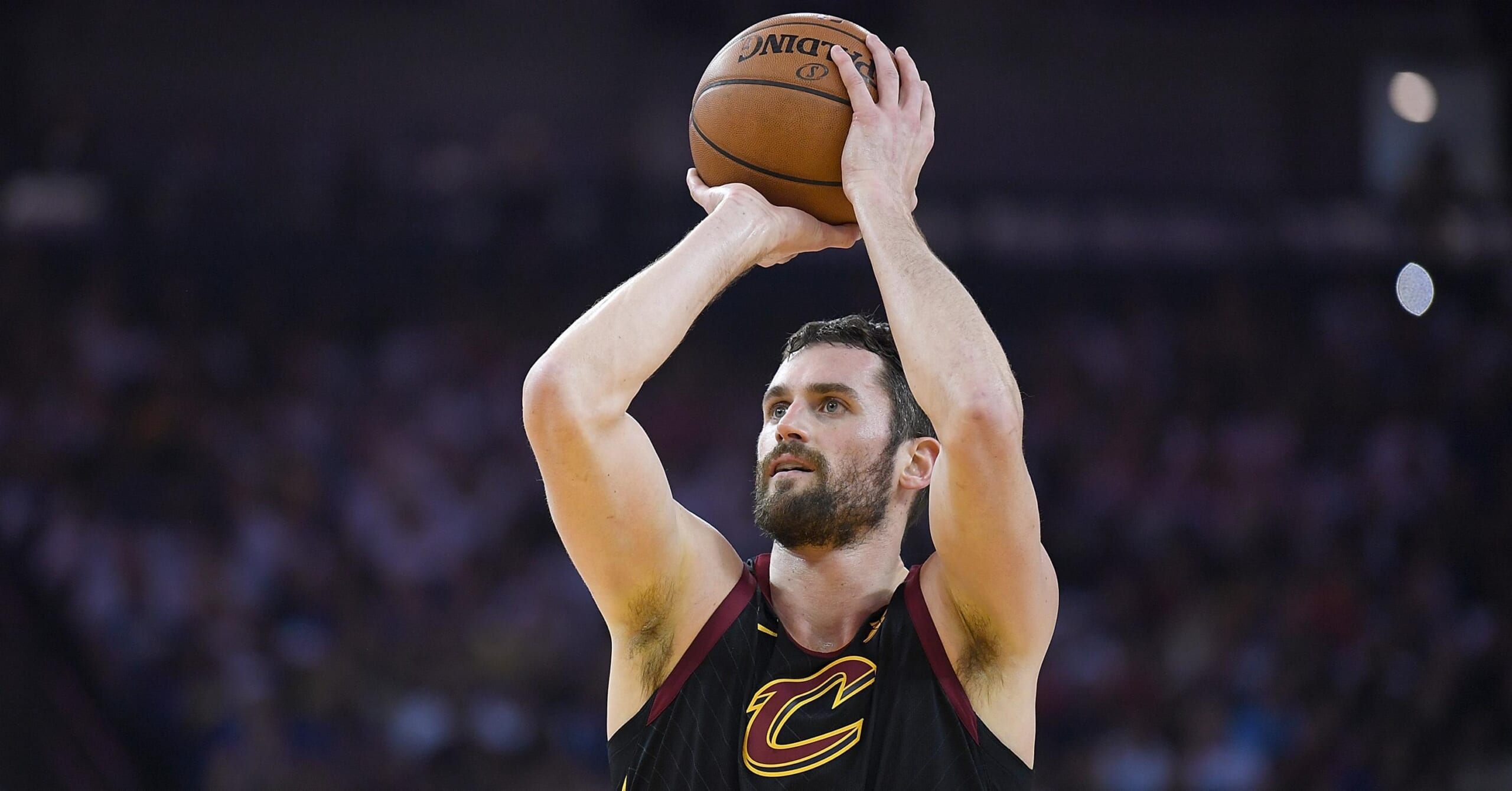Nothing should be hard for Kevin Love. First, there’s his career. Since nabbed as the fifth pick in the 2008 NBA draft, the 31-year-old has become one of the NBA’s elite. In 12 years as a pro he’s averaged 18.2 points and 11.2 rebounds per game (as of mid-January), earned five All-Star nods, made four straight finals (2015–2018) and taken home the NBA championship in 2016 with his current Cleveland Cavaliers team.
Next? The money. He recently signed a four-year, $120 million dollar contract extension, and combined with an annual $4 million in endorsement deals from companies including Nike, Old Spice and American Greetings, the Oregon-raised athlete pocketed a cool $28.4 million in 2019, earning him a spot on Forbes’s annual world’s highest paid athletes list.
And let’s not forget the talent. Since childhood, the 6′8″ power forward has been a multi-tool player, combining big-man dominance on the boards with a deadly sharp-shooter’s touch. “The big thing in the league is the All-NBA Team,” longtime NBA play-caller Mike Breen tells Maxim. “And Kevin’s made that twice. He had good numbers early in his career and turned them into spectacular numbers.”
There are also the Hollywood heartthrob looks and classic, refined style that regularly lands him on the pages of fashion magazines; a guy who can as easily break down the nuances of the perfect pick-and-roll as discuss the subtle beauty of his favorite Audemars Piguet Royal Oak watch. Lastly, there’s his girlfriend, Canadian supermodel and current Maxim cover model Kate Bock, whom he’s been dating for nearly five years—not that the busy couple has been able to spend all that much time yet at the house he recently bought in New York.
From every angle, Love appears to be runner-up to Tom Brady for the winner of the Best Pro Athlete Life Ever award. But life isn’t as it looks on Instagram. Pro athletes might be superstars but they’re not superheroes. While Love is both grateful and humbled by his professional and personal fortunes, he has faced—and continues to face—very real struggles both on and off the court.
Love’s most obvious battle has been with his body. A fractured hand. Toe surgery. A bad left knee. Chronic back issues. Over three seasons, the Cleveland forward missed 105 games. Then there’s the matter of his team. Number 0 signed his latest contract with the understanding that he was the foundation for the soon-to-be rebuilding, and LeBron-less, Cavs (James left for the Los Angeles Lakers in July 2018). Those building blocks, however, have yet to materialize.
But arguably the biggest challenge Love has ever faced has been coping with his mental health. “I’ve always felt those dark clouds, that anxiety,” he admits. “I never to talked to anyone about it. Even my best friends didn’t know. And it never really went away, but I kept it at bay.”
Through it all, Love could have easily hid behind his PR people or fired off a few all-too-typical famous athlete platitudes. But what he eventually did makes him a unique modern sports star. He opened up. Addressed the issues. Owned them. In March 2018, he penned a now-famous story for The Players’ Tribune chronicling a 2017 panic attack that forced him to leave a game against the Atlanta Hawks. “I didn’t want anyone to tell my story but me,” says the All-Star.
In it, Love discussed his trouble dealing with those dark clouds. He admitted he went to therapy. He blew up the traditional notion of the athlete—the stoic warrior who doesn’t ever speak about feelings, emotions and fears. In essence, the story was Love’s public admission that he’s still a work in progress, a man grappling with his own evolution. The repercussions of Love’s groundbreaking story still resonate today. In September 2018, he announced the launch of the Kevin Love Fund, a trust dedicated to helping people with their physical and mental well-being.
The most significant change came from the NBA itself when, prior to the start of the 2019-2020 season, league officials adopted a new rule requiring all 30 teams to have at least one licensed mental health professional—a psychologist or behavioral therapist—on their full-time staff. “I’m still surprised,” says Love about the outpouring of support since the article came out. “I couldn’t believe the vast number of people affected.”
As for his ongoing journey, Love has incorporated a variety of practices that bolster his personal wellness. Therapy. Meditation. Travel to destinations like Southern Utah, the Philippines, and the Cascade Range not far from his childhood home. “Kate and I are both from the Pacific Northwest,” he says. “And the outdoors allows us to take a breath, keep moving. It’s great for both the mind and body.”
This work he’s doing on himself is paying off. After some recent frustration-induced incidents (one involving his GM and another during a game against Oklahoma City), Love once again showed a maturity not often seen in pro sports. “I wasn’t acting like a 31-year-old, I was acting like a 13-year-old,‘‘ Love told reporters. “That was childish of me, and just goes to show you, I‘m an unfinished product, like anybody. I know I can get a lot better, and that can‘t go on here, especially when you have young guys that you are trying to help.”
With his fame, fortune, supermodel girlfriend, and assured place in NBA history, it’s easy for people to dismiss Love’s difficulties. Yet it’s precisely his considerable advantages that will enable him to help make the NBA, and the world at large, a better place.
